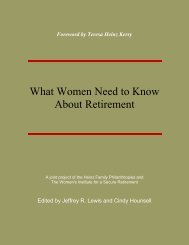What Women Need to Know About Retirement - Wiser
What Women Need to Know About Retirement - Wiser
What Women Need to Know About Retirement - Wiser
Create successful ePaper yourself
Turn your PDF publications into a flip-book with our unique Google optimized e-Paper software.
First, Balance Your Bills<br />
To build your lifetime money plan, start with what’s most important—your basic necessities.<br />
These are the “must-have” bills—those you need <strong>to</strong> pay month in and month out, no matter what.<br />
This includes your rent or mortgage payment, utilities, insurance, car payment, regular medical<br />
bills, and any legal obligations (such as student loans). If you pay for daycare so that you can go<br />
<strong>to</strong> work, it goes with your must-have bills. The list also includes a basic food allowance (just the<br />
bare essentials—T-bone steaks and restaurant meals don’t qualify as “must-have” bills). Add all<br />
these regular expenses up, and call the list your “Monthly Must-Have Expenses.”<br />
Generally, you should be able <strong>to</strong> cover your monthly must-have expenses on 50 percent of your<br />
take-home income. That’s right—half your money can go <strong>to</strong> must-haves. If you keep your<br />
must-haves <strong>to</strong> 50 percent of your income, you will have plenty left over <strong>to</strong> spend for fun, and<br />
enough left over <strong>to</strong> save for your future. Keeping the must-have expenses in balance will give<br />
you a solid foundation for your lifetime money plan.<br />
<strong>What</strong> if you can't manage your bills on 50 percent of your income? Then this is a strong sign<br />
that it is time <strong>to</strong> cut back. Maybe you should send back the rent-<strong>to</strong>-own television. Maybe it is<br />
time <strong>to</strong> move <strong>to</strong> a smaller apartment or <strong>to</strong> trade in the car for something cheaper. Maybe you<br />
need <strong>to</strong> share expenses with a roommate or a family member. Do whatever you can <strong>to</strong> get your<br />
basic expenses down <strong>to</strong> half of your income. These can be <strong>to</strong>ugh choices, but in the long run<br />
you'll live happier and rest easier if you start <strong>to</strong> get your budget straight now. Take a closer look<br />
at your expenses with the help of a worksheet available at www.wiserwomen.org.<br />
<strong>What</strong> if you just can’t get it <strong>to</strong> 50 percent right now? Then get as close as you can. If you are<br />
spending 65 percent of your income on must-haves, maybe you can bring it down <strong>to</strong> 55 percent.<br />
It’s not perfect, but it would be a big step <strong>to</strong>ward building a more secure future. And once<br />
you’ve done your best, set a goal for getting your must-haves in<strong>to</strong> balance. Maybe it will be in a<br />
year, once you finish paying off your car. Maybe it will be in two years, once the youngest child<br />
starts kindergarten and your daycare bills go down. The point here is <strong>to</strong> keep your eye on the big<br />
picture—your long-term financial health. It may take a while until you get everything under<br />
control, but every step you take in this direction makes your life better <strong>to</strong>day and <strong>to</strong>morrow.<br />
Second, Pay Off the Debt<br />
The medical bills from last year’s visit <strong>to</strong> the emergency room. The money you borrowed from<br />
cousin Charlie that has been hanging out there for over a year. The credit card balance that has<br />
bounced around for more than a decade.<br />
You don’t need a scrapbook. Your bills tell your his<strong>to</strong>ry. Every debt, every monthly payment,<br />
every dollar you owe is a claim against your future.<br />
Americans from all walks of life are carrying more debt. Kids still in college, married couples<br />
with kids, single men and women, rich people and poor people—debt is everywhere.<br />
And yet, when most people think about planning for retirement, debt is nowhere in the picture.<br />
(And when experts talk about retirement, many seem <strong>to</strong> assume that no one has any debt.) But<br />
the reality is that the over-50 crowd is carrying more debt than ever before in his<strong>to</strong>ry. They have<br />
credit cards and car loans, and many are responsible for student loans they <strong>to</strong>ok on <strong>to</strong> help their<br />
13




